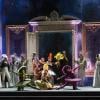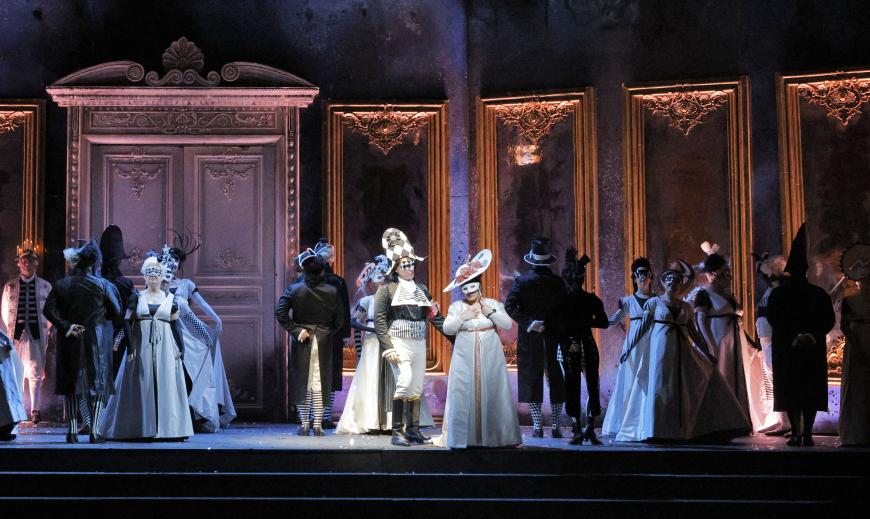
As an expression of what makes grand opera grand, the last scene of San Francisco Opera’s Un ballo in maschera (A masked ball) has pretty much got it all.
On the stage of the War Memorial Opera House, filled with an opulently costumed, elegantly deployed chorus of masquerade partygoers and a half dozen gaudily dressed dancers to entertain them, a murder is about to take place. As King Gustavus III’s politically driven would-be assassins lurk in the crowd, it’s the monarch’s jealousy-maddened chief minister and best friend who fires the fatal shot in stark white light. In a masterstroke of musical irony in Verdi’s score, a dainty waltz tinkles into tragedy — idle pleasure and a love-triangle climax dramatically fused.
None of this comes cheaply, a fact acknowledged on Friday, Sept. 6, the opening night of SF Opera’s 102nd season, in a video tribute to former board chairman John Gunn and his wife Cynthia, major donors to the company for decades. Fittingly, a majority of the Ballo cast members are SF Opera veterans — the artistic excellence and continuity that philanthropy supports. Music Director Eun Sun Kim led a boisterous account of Leonard Bernstein’s Candide Overture in the Gunns’ honor, followed by the customary season-christening “Star-Spangled Banner.”
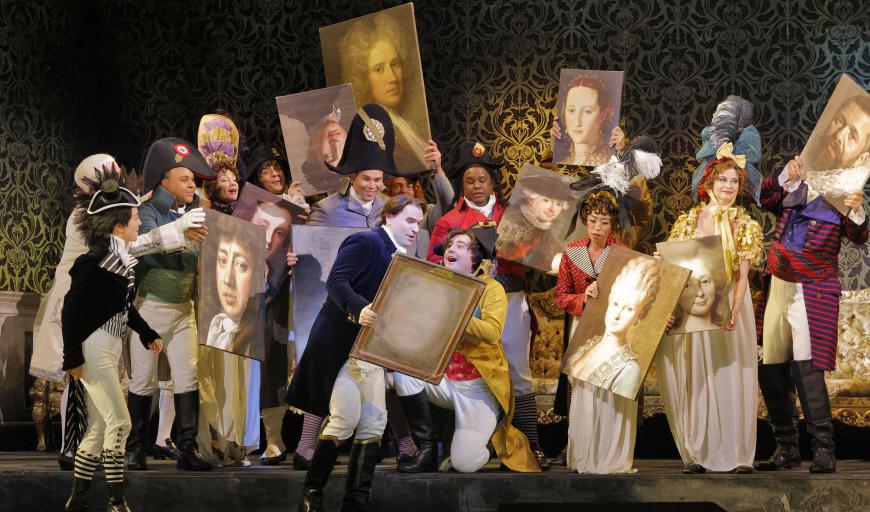
When the curtain on Ballo rose midway through the overture, a mimed dumb show presaged the action to come. It was a mysteriously effective touch in director Leo Muscato’s production (first mounted by the Rome Opera), a signal of the opera’s taut narrative compression. Verdi’s 1859 Ballo, with a libretto by Antonio Somma, was inspired by an actual masked-ball assassination in Stockholm.
Party plans come first as Oscar, the king’s page (the delightfully nimble soprano Mei Gui Zhang), offers her boss (tenor Michael Fabiano as Gustavus) a guest list for his approval. The first name that jumps out at him is that of Amelia (soprano Lianna Haroutounian) — the wife of his friend Renato (baritone Amartuvshin Enkhbat) — with whom the Swedish king is in love. During Friday’s performance, when the two friends were together, the contrast in their affects and musical deliveries was gratifying and persuasive. Fabiano’s virile, emotionally combustive tenor and Enkhbat’s burnished baritone and slow-to-burn solidity registered as a doomed connection of different temperaments, a fated bond.
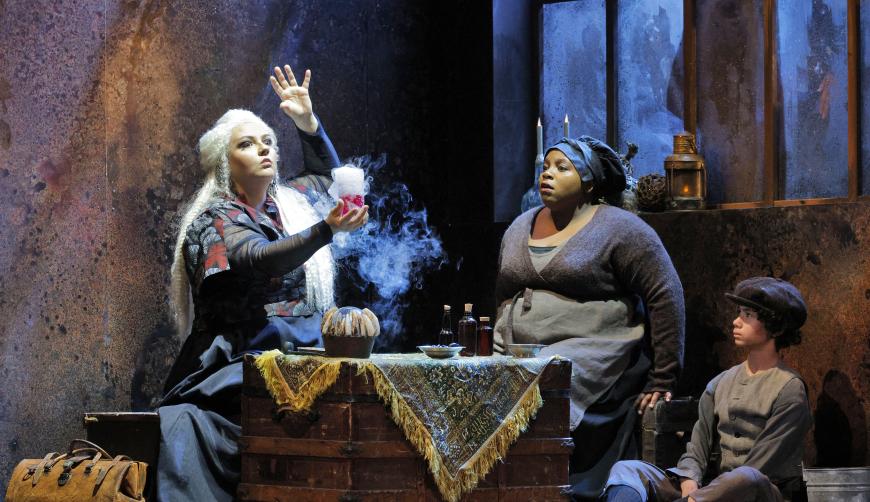
When the action shifted to a soothsayer’s dark den, set designer Federica Parolini and lighting designer Alessandro Verazzi conjured a murky scene that Goya might have painted. Singing with an ominous heavy vibrato and sporting witchy long white hair, mezzo-soprano Judit Kutasi as Ulrica foretold one grim fortune after another, none more startling than the death, augured by a handshake, of the king. Meanwhile, his beloved Amelia has been sent off to find an herb to purge her own amorous feelings for the king. With Kim eliciting surges of dark color from the orchestra, the propulsive first act ended with one of the opera’s compelling ensembles.
The second act opened in a bleak landscape that looked more like a toxic waste site, with its perpetual fog plumes, than a natural environment. Haroutounian, in her anguished love duet with Fabiano’s lovestruck king, sang with depth and amplitude, a performance mitigated by her stock gestures. Once again, in a well-staged scene, the opera’s narrative drive took hold, as first a band of assassins and then Renato arrived to discover his wife’s apparent betrayal.
Enkhbat was marvelous at the top of the third act, his voice now steely with dishonor and determination for revenge; he gave Renato’s distress an air of existential primacy, even as his character wrestled with an impulse of mercy for Amelia. Fabiano gave the king’s guilt a propulsive, anguished intensity in a subsequent bravura solo. And then it was on, seamlessly and inevitably, to the masked ball.
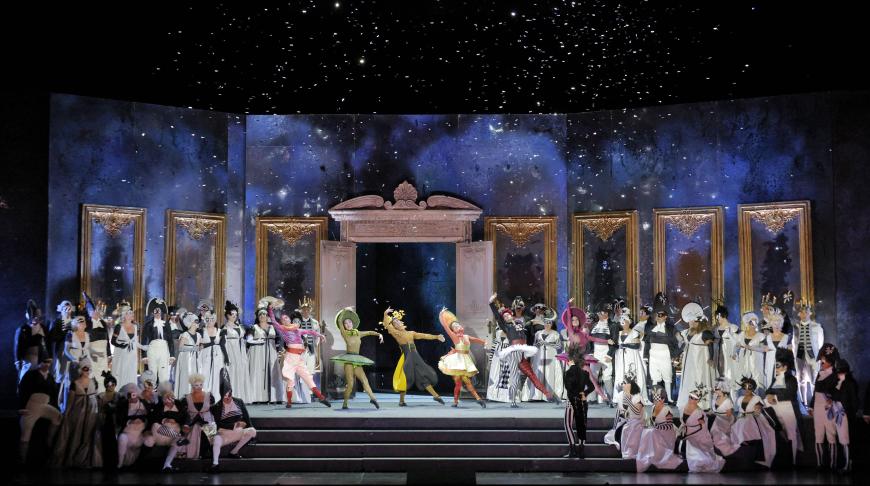
For all its darkness, this Ballo came off with luminous grandeur and touches of humor. Kim conducted with urgency and grace. The chorus sang with character and conviction. Silvia Aymonino’s costumes paid off in every particular, from military finery to working-class humility to the extravagance of a corrupt king’s court. Sporting a smart cutaway coat and bristle-topped headpiece, Zhang’s Oscar was like a buoyant demigod, a Swedish Mercury bopping along to the music, as if she — and the few choristers who joined her — knew they were in an opera and bent on delighting in it.
The end was both terrible and cathartic, as Fabiano made the challenge of a long dying-man aria as theatrically convincing as possible. And so he did, down to his last exhausted note.
SF Opera’s production of Verdi’s Un ballo in maschera runs through Sept. 27, with the Sept. 15 performance available for livestream viewing.




